- CPBC 70020
- (778) 877-7540
- Contact Us
Pre-Listing Inspection – Inspections For Sellers
Avoid renegotiation, Delays, Stress and deals falling apart with a pre-inspected home.
Home > Pre-Listing Inspection – Inspections For Sellers
What is a Pre-Listing Inspection?
A pre-listing home inspection uncovers potential surprises that could derail the sale of your house.
Stay in Control

Sell Faster

Sell for More Money

Save Money

Reduce Liability

Use as a Marketing Tool

Reduce Stress


Pre-Inspected Homes & PreInspected.com

Home Inspection

Fix Items

Add Report on PreInspected.com

Marketing

Speed Up Sale

Enjoy
The inspections are the exact same. It is the same standard of practice, the same agreement, the same cost, the same everything. We are an unbiased third party that has no gain or loss whether the property sells or not. Our goal is that if the buyer decides to hire his own inspector, that both reports are fairly the same and nothing of importance is reported that wasn’t already part of our report.
The best is to do it before it goes on the market to give you time to fix a few items, if needed, that could make the sale of the house difficult, but it can be done while it’s on the market. We recommend doing it as early as 2-3 months before listing the property. If it’s on the market, get it pre-inspected and take advantage of all the benefits of making the report available to prospective buyers on PreInspected.com to speed up the sales process.
If the house is in a state that would discourage prospective buyers to learn more after reading the report, we recommend that the agent doesn’t publicize the report and not to add a lawn signs promoting the report. Agents can be honest and upfront to prospective buyers that visit the open houses or request more info by phone or email by letting them know that the house is pre-inspected and that they like to talk to them about the deficiencies found and why they have adjusted the price the way it is. If nothing is said, the buyer inspection could kill the deal.
Giving the inspection report to prospective buyers not only shows that you are honest and upfront but since this house is getting inspected no matter what, staying in the driver’s seat is paramount. If you let the buyer take control of the inspection process, it will result in delays, stress, renegotiation and possible killing the deal. Since this house is getting inspected, the seller has much to gain by getting it done at the beginning of the transaction and taking control of the inspection process.
On the contrary, pre-listing inspections will alleviate fears in prospective buyers. They will give the buyer a clearer picture of what they’re actually falling into. Many buyers are afraid of potential pitfalls that they may encounter in the purchase of a new home. With a pre-listing inspection, the seller can provide full disclosure to the buyer, thereby eliminating any prospective liability for the seller, and, at the same time, allowing the buyer to reach a fairer purchase price by disclosing defects in advance.
The obvious benefit to the buyer is having the advantage of having any defects disclosed ahead of time, before the parties actually agree on a purchase price. Additionally, if the seller does a pre–listing inspection, it can save the buyer on closing costs, as it can avoid the need for the buyer to do a separate, independent inspection.
Actually, no, it won’t be. Inspectors are independent, third-party who are entrusted with providing unbiased opinions. Nonetheless, a buyer may choose to hire their own inspector to conduct an inspection on their behalf.
No, actually, pre-listing inspections help the deal go more smoothly. By identifying problematic areas in advance, the parties are able to address and rectify any issues before agreeing on the final purchase price. By fixing the issues in advance, the seller can then rely on a more accurate selling price, and the buyer has the assurance of knowing there won’t be any pitfalls in the near future.
The seller inspection report is done for the seller and does not protect the buyer. It is not designed to protect the buyer but to be used as a guide only. It is not a substitute to a buyer inspection and it is highly recommended that the buyer gets his own home inspection.
Absolutely not, the buyer needs an inspection in order to be protected. If they do get their own inspector, it will reinforce trust and credibility as the reports will be very similar. The seller inspection report will be almost identical to the buyer inspection report. From experience, about half of the buyer waive their inspection contingency.

Proudly Service the Vancouver Lower Mainland and the Fraser Valley.
LATEST POST
“Inspect Canada is located and does business on the traditional, ancestral and unceded territory of the Coast Salish peoples–Sḵwx̱wú7mesh (Squamish), Stó:lō and Səl̓ílwətaʔ/Selilwitulh (Tsleil-Waututh) and xʷməθkʷəy̓əm (Musqueam) Nations.”

